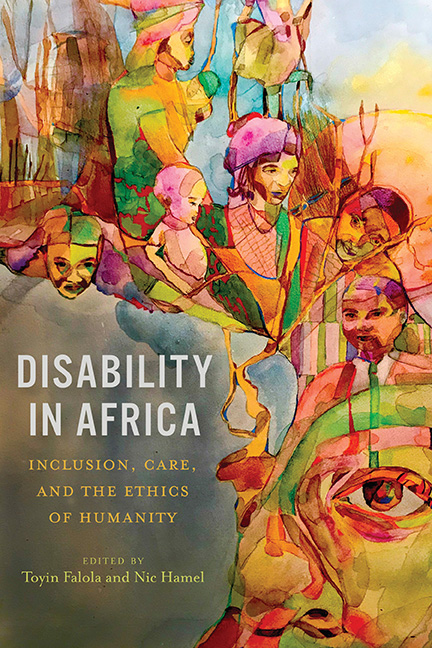Book contents
- Frontmatter
- Dedication
- Contents
- Part One Introducing the Field
- Part Two Theorizing Disability in Africa
- Part Three Representation and Cultural Expressions
- Part Four Education, Community, and Caregiving
- Part Five Activism and Barriers to Inclusion
- Conclusion: A Research Agenda for African Disability Studies
- Selected Bibliography
- Notes on Contributors
- Index
3 - An African Ethics of Social Well-Being: Understanding Disability and Public Health
Published online by Cambridge University Press: 17 June 2021
- Frontmatter
- Dedication
- Contents
- Part One Introducing the Field
- Part Two Theorizing Disability in Africa
- Part Three Representation and Cultural Expressions
- Part Four Education, Community, and Caregiving
- Part Five Activism and Barriers to Inclusion
- Conclusion: A Research Agenda for African Disability Studies
- Selected Bibliography
- Notes on Contributors
- Index
Summary
Introduction
The World Report on Disability states that around 15 percent of the world’s population have a disability, and between 2 and 4 percent have “significant difficulties in functioning.” Increasingly, evidence indicates that most of these people are located in middle- and low-income countries in the Global South and that disability is associated with multidimensional poverty, lower educational attainment, lower employment rates, and higher medical costs. A long-standing obstacle to understanding disability has been the lack of robust statistical data, especially for countries in large continents like Africa. In Africa, Groce relates that in different domains such as health, education, employment, and social protection a disability gap in terms of development now also exists, and this must be tackled by both disability-specific and inclusive policies. Generally, in development discourses disability correlates with what will exacerbate risks in terms of social determinants of health, with inequalities significantly linked to not only individual determinants but also sociopolitical and environmental factors. The seventeen UN Sustainable Development Goals (SDGs) outline this more explicitly, noting links between equity and increasing environmental sustainability. Disability is also correlated more strongly to well-being and mental health, but the focus is on “prevention” and “eradication” of morbidity overall. Significant challenges for many countries are linked to the heterogeneity of development issues as well as greater prosperity, such as multidimensional poverty in the lowest income countries; the short- and long-term disabilities linked to conflict, wars, famine, migration, and infectious diseases; and middleincome countries dealing with rises in communicable and noncommunicable diseases, challenges of rapid urbanization, substance abuse issues; as well as further complexities of both rising youth and aging populations. Additionally, there is the shameful legacy of colonialism and racism in many countries, like South Africa, which continues to have an impact in terms of health inequalities, and how they are lived as intersectionality to ethnicity, gender, age, and socioeconomic status.
Globalization and the economic policies of the World Bank (WB) and International Monetary Fund (IMF) have also had contested influences on public health systems in many countries in Africa and how they were funded. Countries in economic crisis seeking loans have to go to the WB and IMF, and loans often have structural conditions attached to them.
- Type
- Chapter
- Information
- Disability in AfricaInclusion, Care, and the Ethics of Humanity, pp. 75 - 90Publisher: Boydell & BrewerPrint publication year: 2021

